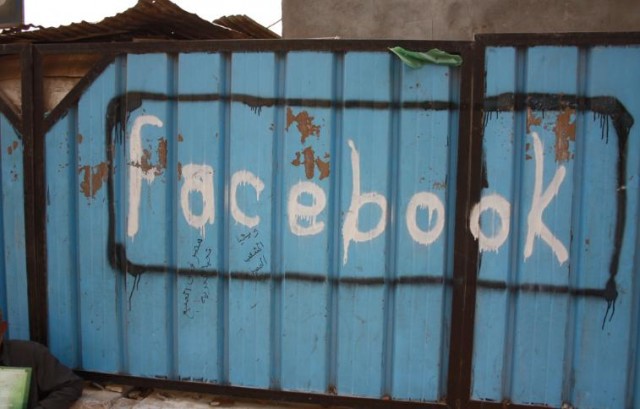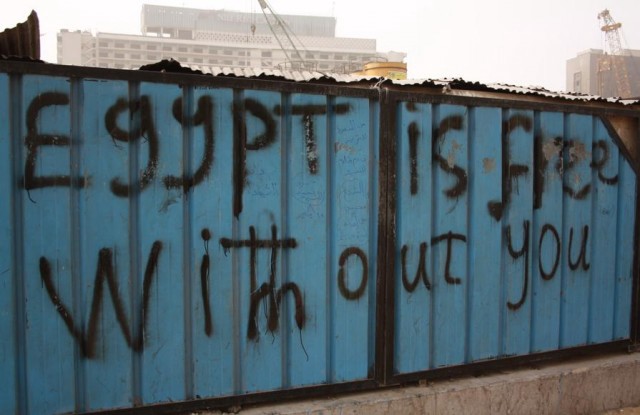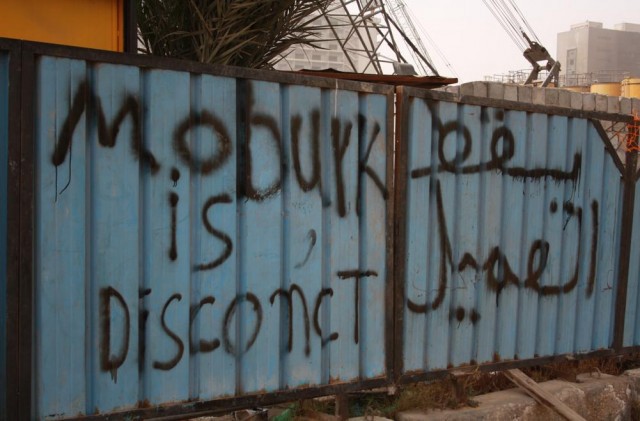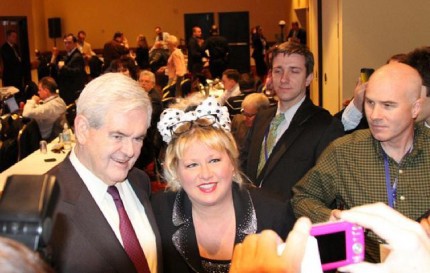Bahrain's Brutal Crackdown Will Inspire a Movement
It’s a little difficult for us in the west to ascertain what’s going on in Bahrain, and a number of other countries as well (Yemen, Iraq, Libya), in some part because these countries are so small, and, unlike Egypt, there are fewer people able to report to us. (More people live in the greater Memphis, Tennessee, metro area than live in all of Bahrain, and Bahrain’s capital — Manama! — has a proper population of fewer than 200,000. So that means when there are thousands of people occupying the area around the Pearl (or Lulu) roundabout, that’s huge. It’s also huge when the state descends on the camp of protesters in the middle of the night, shooting, wounding at least 200.
This is where the demonstrations have been. Zoom out for context.
This, unfortunately, is video from about an hour ago.
But this isn’t the end of the story, even if the state military says “Bahrain defence forces will take all necessary measures to secure safety, order and stability.” Because, what happens when a regime tries to slaughter its citizens? They are furious.
Kenyon talked to ppl b4/after #lulu attack. B4, most said they just wanted political/econ reform. Now they want regime toppled. #BahrainThu Feb 17 13:30:04 via TweetDeck
Andy Carvin
acarvin
Unfortunately, Bahrain forces, just like every other idiot government operation, are also beating up the media, including my old pal Miguel Marquez, who seems to be fine.
Dear Govt of Bahrain, I’d like my camera back, with the disc inside and please do not copy or view material from it.less than a minute ago via Twitter for BlackBerry®
Miguel Marquez
miguelmarquez
Why Do You People Keep Insisting Twitter is "Perfect"?

Malcolm Gladwell apparently decided to stuff and mount his strawman Twitter arguments again: “He said he has it on his BlackBerry and made a ‘chh-chh’ technology sound effect while miming with his thumbs as if he was pressing buttons on a small device. He likes to read things his friends tweet. ‘Like I said, these are awesome tools,’ he added, fidgeting with the top on a water bottle resting next to his chair. ‘I just don’t know why it has to be perfect — right? — or why anyone would claim that it’s good at absolutely everything. Isn’t it enough that it’s an extraordinary means of sharing ideas and bringing people together?’
No, Malcs, it’s not enough for us! Everyone who disagrees with you about your bizarre malformed Twitter thoughts is, indeed, insisting that Twitter is “perfect” and “good at absolutely everything.” I was standing out on the curb all night with a big placard that said just that, and my gosh, I am so sleepy!
On Returning to Cairo
by Christian Vachon

“This country will never be the same,” my driver said when he picked me up at the Cairo International Airport two nights ago. This much Egyptians can agree upon, but this much only.
For the time being, order has been restored. The military is in control. Tahrir Square is clear. Tanks line the streets of downtown Cairo and there are no longer gunshots sounding through the night.
But this country, one that draws something like $10 billion each year in tourism, has been depicted as a war zone for the past three weeks. For now, until Egyptians (and the rest of us) know what happened down in Tahrir Square, the country is left to internalize this revolution without destabilizing its national narrative — one that has changed little since Herodotus first crowned it “the gift of the Nile.”
Not even a week since the departure of Hosni Mubarak, this task seems to have begun. Tonight, from 9:45 to 10 p.m., Nile TV, the state-owned television station, ran a montage of patriotic images set to popular Egyptian music. The video included a series of scenes from the revolution mixed with traditional images of Egypt.
There were Egyptian students, their heads buried in books at the Alexandria Library. There were thousands of Western tourists in sunglasses, flooding into the front gates of the Valley of the Kings. There were attractive businessmen without facial hair, dressed in sharp suits, having important conversations on cellular phones, walking into the front doors of the Cairo Airport. There were farmers with smiling, sun dried faces, plowing their fields. There were long boats of tourists serenely floating down the Nile beneath the setting sun.

And, intermixed, there were images of the Revolution. There was a triumphant young man, standing on a street corner in the night, waving an Egyptian flag in the glow of streetlights. There was the now famous aerial photograph of hundreds of thousands of Egyptians crammed into Tahrir Square. There were young Egyptian men, carrying soldiers on the shoulders, their arms in the air, triumphant. And there were children, their cheeks painted the colors of the Egyptian flag, looking into the camera lens, smiling.
The narrative was simple: a polishing of surfaces. Egypt is beautiful. Egypt is secure. Egyptians love their country. The new, destabilizing revolution and its roots in decades of economic deprivation and human rights abuse was now swallowed up into the placid, rote, prosaic narrative of Herodotus’ Egypt.
On the streets, the revolution’s hermeneutic crisis has resulted in a rapid effort to wipe all remnants of the uprising from the face of the city. In Tahrir Square this afternoon all of the protesters had departed under military mandate. The blue metal walls separating the Egyptian Museum from the street, walls that during the revolution became murals of defiance against the regime are being taken down or painted over.
Throughout the square hundreds of volunteers were at work repainting the sidewalks, gates and railings around Tahrir. Barring the memorial of photos and flowers for those who died in the last three weeks, all physical remnants of this revolution will soon vanish and Cairo will look just as it was.
But in the wake of this revolution, walking through Tahrir, the smell of fresh paint in the air, it did not feel quite the same.

In the five hours I spent walking and photographing graffiti before it was painted over, several Egyptian men approached me. The exchanges were all similar.
They went something like this:
“Hello! What is your name?”
“Peter,” I would lie.
“Yes. And where are you from?”
“Canada,” I would lie again.
“And from where in Canada.”
“Prince Edward Island.”
From here, the men would drop the name of a brother or relative who lives in Canada.
“Are you a journalist?”
“No. I am a tourist.”
“And where is your hotel?”
“I’d rather not say.”
“It is okay. I am not with the government.”

From here, there were requests to follow them into stores around the block to give me business cards for my supposed friends back in Canada. I followed one man in his 60s around the block under the premise he would give me his card. He led me to an empty blown out store with two dusty chairs. While I stood in the doorway he sat down and offered me a seat. I declined and walked away.
In the late afternoon I was standing in the center of Tahrir Square. All around were families carrying flags, smiling. There were children climbing onto tanks, posing for photos, leaning on cannons — like a militarized amusement park. I was taking a photo when I was stopped by a man carrying cups of tea on a tray.
“For you,” he said, handing me a cup.
I thanked him, took the cup, placed it on the step beside me and continued to take the photos. A few minutes passed. The man had walked away. A teenager wearing sunglasses walked over, stood beside me, and looked ahead.
“Do not drink that tea,” he said, looking out on the street. “It is dangerous.”

It is easy to forget this in the jubilation of Egypt’s first week, post-Mubarak, where cosmetic adjustments erase relics of the fury that ignited this revolution.
As Egyptians celebrate their victory, activists are using Twitter to compile lists of protesters still believed to be in detention. This afternoon the minister of education announced that schools would be closed through next week due to instability nationwide. Banks will be closed until Sunday. Protests and strikes by the police, textile workers, airport workers and others continue despite military pleas for Egyptians to return to work.
The uprising resulted in the removal of one dictator, but there is a feeling that the social hydra of his legacy waits just beneath the surface, barely visible beneath a sea of his bright-eyed, flag-waving countrymen.

Gordon Reynolds is the pseudonym of a teacher in Cairo. He also posts regularly to Twitter, if you follow him there.
20 People to Follow on Twitter: @kfan
The good china really isn’t all that good but it probably hasn’t had my junk on it recently, so, you know, l’chaim.Wed Feb 16 02:09:34 via web
Joshua Allen
fireland
The chances are decent that you may already follow Fireland on Twitter, the latest incarnation in Josh Allen’s longtime Internet Entertainment Complex. But do you follow Kevin Fanning? His strong suit is nerd jokes about the Internet.
I’d let my kids starve naked in the streets before I ever looked directly at a barista with stretched-out earlobes.Wed Feb 16 01:40:34 via web
Kevin Fanning
kfan
Such an endearingly wistful sigh accompanied my removing the caprica_fans community from my livejournal friends-list earlier today.Fri Feb 04 03:43:45 via web
Kevin Fanning
kfan
Sometime I feel so degraded and useless, like the entire world is looking at me through IE6.Mon Jan 17 23:43:51 via Birdhouse
Kevin Fanning
kfan
How I Read The Internet, by Kevin Fanning: I look at the name of the person who wrote the article, not the title of the post. The end.Tue Dec 21 02:56:56 via web
Kevin Fanning
kfan
So with tumblr down what’s everyone doing with their blurry pictures of girls wearing windowpane tights?Mon Dec 06 01:44:30 via web
Kevin Fanning
kfan
20 years ago, if you wanted Queen’s Live Aid setlist you had to send an SASE to John Deacon.Wed Nov 17 02:47:15 via Birdhouse
Kevin Fanning
kfan
Things You See In The Videos For Cee-Lo's "Bodies" And Damien Marley And Nas's "Sabali (Patience)"
Name tag
Polaroid camera
Polaroid pictures
Kate Moss
Pack of Trojans
CD cover for Above the Law’s 1996 album, Time Will Reveal
African tribal mask
New York University diploma
Fur coat
Irises
Swimming pool
Clouds
Balloons
Pistol
Eagle-headed drummer sitting in lotus position
Rolls Royce convertible
Kerry Washington
Blood
Socket wrench
Neon signs
Los Angeles Times
Aquarium
Whale shark
Thresher shark
Nurse shark
Courtroom
Judge
Eagle-headed convict
Monkey playing bass guitar
Jean-Michael Basquiat’s “Pecho/Oreja”
High-heeled shoes
Acrobats
Tigers jumping through hoops of fire
Elephants
Hippopotamus-headed waiters serving champagne
Karl Lagerfeld
BMW sports car
Smoke
Affleck duck
Billboard
Circus tent
Fireworks
Sunglasses
Hypodermic syringe
Solanine glycoalkaloid
Great white shark with human arm and leg dangling from jaws
Knife with Karl Lagerfeld handle
Cadaver diagram
H&M;
Hippopotamus-headed chauffeur
Ocean
Common
Sunglasses on pedestals
Janelle Monae
Denim vest
Pyramids
Crumbling statues of Cheops
Palm trees
Elephants
Fire
Zebras
Male lion
Mountains
People walking over ancient Greek aquaduct
Crowns
Robes
Sunglasses
Hieroglyphics
Ceremonial masks
Lightning
Clouds
The moon
The ocean
A waterfall
Mermaids
Statues of Horus
The desert
Sand dunes
Shooting stars
Spears
Ancient ruins
Cross
Star and crescent
Statues of people drinking from pitchers while riding on the backs of griffons
Black panther
Snifter of Brandy
Thrones
Space
Eagles
Damien Marley and Nas silluetted against the full moon just like Jeff Bridges and Hailee Steinfeld at the end of the Coen Brothers’ True Grit, which I did not enjoy as much I usually enjoy Coen Brothers movies. They’re really my favorite moviemakers. But True Grit was just okay.
And, of course, both the above videos owe a debt to Kanye West’s “Power.”
And they all owe a debt to Terry Gilliam.
That Is One Big Bear
Who is taking me to see The Great Bear?
Jonathan and his little sister Sophie are on holiday at they grandfather’s cabin deep in the forest. Jonathan tries to get rid of Sophie, but when he finally succeeds, it’s in a way Jonathan would never have imagined.
Sophie has been kidnapped by a huge bear, and now he has to somehow find her and get her back home. In the course of their journey the two are mixed up in an epic battle between a hunter dwelling the forest and the great bear. But before Jonathan and Sophie can save themselves, the forest and the bear from an evil fate, they have to accept each other as brother and sister.
Yeah, okay, it’s in Danish, and sure, who gives a shit about animated characters learning to “accept each other as brother and sister”? Look at that fucking bear! It’s huge! Anyway, who’s taking me? WARNING: You will have to buy me popcorn and be complicit in the sneaking in of several flasks.
Wisconsin Taken Over by Working People
Just in case you’re busy tracking unrest in Bahrain or elsewhere around the globe, you should also know that Wisconsin’s capitol is still actually totally occupied, due to its governor being an enemy of working people everywhere. Live coverage here and here.
This Does Not Seem Like A Good Way To Sell Windows
To Britain, where one salesman took the concept of “glassing” to a whole new level: “A cold-calling salesman threatened to fine — and even kill — vulnerable pensioners if they didn’t buy new windows The bogus ‘businessman’ told Paul Shipman, 68, he would put his head in a vice and watch him ‘bleed to death’ because he wouldn’t buy double glazing from his firm.”
CPAC: The Big Gay Careerist Conservative Future
by Ana Marie Cox

You could have attended all of the speeches by the 15 or so potential presidential candidates who appeared at this year’s Conservative Political Action Conference and only had the slightest notion that anything of note was happening in Egypt. The young conservatives gathered there have their own leaderless revolution to foment. The long-time president of the American Conservative Union, which sponsors CPAC, stepped down the day before the conference began to become the head of the National Rifle Association. And the CPAC Straw Poll, the first of many basically meaningless contests for all those 2012 Republican hopefuls, gave attendees a baffling array of candidates to choose from. There was even a not-very-enthusiastic write-in campaign for Donald Trump — who showed up mostly to trash Ron Paul.
Paul, the gnomic Texas Congressman who has already led two quixotic presidential runs as a staunch libertarian, wound up winning the poll with 30 percent; Mitt Romney brought in 23 percent and after that the field split into drips and drabs of 6 percent and below. Trump’s typically belligerent speech — he wondered if America was becoming “the laughingstock of the world” — won him one percent. Not bad, considering the write-in campaign was as light and hollow as his hair. It stemmed entirely from his accepting the invitation of GOProud — an organization of gay conservatives whose inclusion at the conference is a source of a controversy of far greater interest to reporters than most attendees. At the GOProud booth, they gave out black-and-white Xeroxed flyers asking people to write-in Trump, but were not so very enthusiastic about it. “We do not endorse any candidacy or campaign,” two said, almost in unison. What about the flyers? “We want him to be considered.”
The unassuming booth, where they also pass out stickers bearing the slogan “Our gays are more macho than their straights,” is the reason why a some conservative groups — including the Heritage Foundation and the Family Research Council — backed out of the event rather than share oxygen with open homosexuals.
Anticipation of a wide open and contentious 2012 primary contest ballooned attendance of CPAC. The American Conservative Union attests that they recorded the largest number of registered attendees in the conference’s nearly 40-year history: 11,000 “conservative leaders and activists.” Mainstream news outlets arrived in large numbers as well though the two groups were after very different things. Reporters sought tea leaves to read (and Tea Partiers to mock); the students were largely concerned with their careers. (Honestly, both constituencies would be better served by trading goals.) Reporters crowded around elected officials and interviewed the guy walking around in a Revolutionary War costume. Students crowded into meeting rooms for sessions such as “Secrets to Landing a Conservative Job,” “Getting Started in Hollywood,” and “Becoming a Columnist.”
Though larger than ever, and certainly attracting as much attention as ever, CPAC in 2011 was curiously unmoored. The exhibit hall was a riot of competing ideologies. There are not one, not two but three groups that claimed to support “liberty”: Young Americans for it, a Campaign for it, and Students for it. The latter two actually work in concert, while the third eschews politics in favor of a “purely philosophical” agenda. “We do not support any candidate, campaign or party,” the representative said, handing out pamphlets on becoming a “Students for Liberty” campus leader. I ask what a leader would lead toward, if not a specific campaign. “You’d be a leader for liberty.”
A lot of exhibit hall booths had the same buoyant directionlessness. Maybe conservatives have become so good at co-opting the language of generically good goals — who could argue with the titular premise of Americans for Prosperity? — that their messaging strategy has fallen in on itself, relying on a conservative audience’s ear for hidden meanings to such an extent they have no hope of reaching anyone else. A friend and I, as University of Chicago graduates, were drawn to the “Youth for Western Civilization” booth, for example, thinking maybe to score some free copies of The Illiad, only to discover that, as my friend put it, “They don’t mean Western Civilization” — with its riot of competing philosophies and constantly evolving definitions of freedom — “they mean us, in the building, right now.”
GOProud’s booth was just around the corner from “The American Society for the Defense of Tradition, Family and Property” — a Catholic organization that fancies itself a home for modern-day Crusaders. Its representatives wore jaunty red capes that are somewhat at odds with their literature, which condemned the opening up of CPAC to the gay group. It is also an all-male group, with fantasy camps for boys where attendants dress in the white tunics of Crusaders and practice archery. Asked if there isn’t some concern that aligning itself with the Crusades — the Pope has apologized for them, after all — a representative told me that the Crusades are misunderstood: “It was a defensive war.”
The TFP boys recognized that they were fighting a defensive war themselves when it comes to keeping the conservative agenda staunchly anti-gay, but their attitude toward the battle conformed to the marketplace-of-ideas calculus that imbued the event: “We wanted to make our voice heard.”
For a party that has planted its flag on the backs of our armed forces, talk of the war on terror at CPAC was limited mainly to discussing incursions on the homefront. Early on I was accosted by a leafleteer drumming up support for “Secure America Now,” a militant-sounding group that actually (thankfully?) interprets its mandate metaphorically: “We want to alert people to threats to the American way of life.” Even the appearance of Don Rumsfeld to accept an award — and a surprise cameo by Dick Cheney to present it — made for weirdly parochial rhetoric. A contingent of the crowd reminded everyone of what Cheney and Rumsfeld left unsaid: pro-Ron Paul hecklers shouted “War criminal!” and had to be escorted from the hall.
The Ron Paul contingent was so weirdly, asymmetrically present at CPAC that it disturbed conference regulars. As one co-sponsor said, “I don’t know what to expect next year. It’ll be a different conference.”
As for this year’s conference? The conservative movement is so divided they can’t even decide how to delegitimize an election. “The Paul people bought it,” said a guy from Americans for Tax Reform of the Straw Poll. Isn’t that the point? You guys believe in a free market, right? And on abolishing campaign finance reform? He paused. “You have a point,” he said. “But that doesn’t mean it means anything.”
Ana Marie Cox is GQ’s Washington correspondent.
Photo by Mark Taylor.
